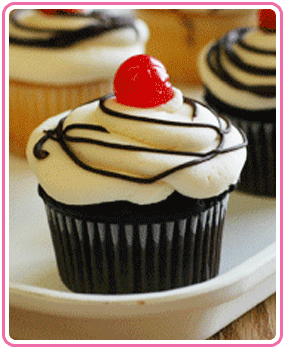
image source www.cupcakedelights.com
Over at the on-line music publication The Quietus, UK-based writer Meryl Trussler reacts to what she perceives as a “counter-campaign” to make feminism palatable to the mainstream media (at worst) or “cool again” (at best):
This move is not deliberate – probably not even conscious. But the pop-culture image of feminism today – as perpetuated at Ladyfests, in BUST magazine and its Craftaculars, on so-called ‘ladyblogs’ and at freshers’ fairs – is ostensibly the direct opposite of the Hairy Dyke. For simplicity’s sake, we’ll call her the cupcake feminist. * * *
Twee and retro have been seeping into feminism for a couple decades now, gaining potency. It’s all about cute dresses, felten rosettes from Etsy, knitting, kittens, vintage lamps shaped like owls, Lesley Gore. And yes – a lot of cupcakes.
It would be hypocritical to dismiss cupcake feminism outright….[T]o tell women they are letting down the cause is vomitously snide and unproductive – and I like the associated aesthetic as much as anyone. (Except for knitting, which for me could only end in injury.) Admittedly, too, the cupcake feminist is a sophisticated invention. Rouged, lipsticked, cinched at the waist, she performs big-F Femininity as the drag–show that it is. Her 50s-housewife schtick sets off everything about her that is radicalised and new. And, importantly, she emphasises that typically ‘feminine’ pursuits are no less worthy or important than their ‘masculine’ counterparts.
By now, however, western women have largely reclaimed and detraumatised the concepts of marriage and homemaking. Sure, a person can still raise some hell and eyebrows with the housewife trope if, say, her grandmothers were more likely to be domestic labourers than ‘goddesses’, or she sports a poodle skirt in her wheelchair; more subversive yet if (gasp!) a man should take the role. But on a relatively privileged woman, the sugar’n’spice act counters next to no expectations. It comes off more nostalgic than ironic.
The full piece is here. It’s worth reading.
I take Ms. Trussler’s principal point to be that the embrace of traditional “women’s work” and cutesy, girly products is too subtle to be an effective instrumental expression of any feminist impulse; it “comes off more nostalgic than ironic.” The point about nostalgia is well-taken. Remember the celebration of Barbie in Manifesta? In their 2000 book, Amy Richards and Jennifer Baumgartner wrote:
Barbie didn’t so much influences us as she was a blank screen on which to project what was happening in our heads. * * * Barbie stands as a symbol of the lack of understanding between the leaders of the girls’ movement and the girls themselves: this is hotly contested territory. The traditional feminist distaste for Barbie has also kept many young women closeted about their dolly-loving past. They fear that loving Barbie will water down or jeopardize their feminism.
Ms. Trussler does not mention Barbie in her Quietus piece, but I suspect she’d detect “cupcake feminism” in the third-wave embrace of Barbie. (Come to think of it, depending on the doll and the owner, Barbie herself might have been a cupcake feminist, too. There’s Dentist Barbie, Astronaut Barbie….) But at the time Manifesta was published, Richards and Baumgartner were making a bold statement. There were few other feminists at the time who touted the doll’s feminist credentials. Barbie resonated with women born in the late 1960’s, 1970’s, and early 1980’s — those who were roughly 20 to 40 at the time of Manifesta‘s publication.
But just as Richards and Baumgartner were reacting to the feminists who preceded them, now Trussler is reacting to the third-wave embrace of things “girly,” of which Barbie is one example. So might a critique of “cupcake feminism” be a critique of third-wave feminism? I’m not sure. It is possible to read Trussler as critical of feminism’s failure to “raise hell and eyebrows,” a call to “counter expectations” without calling out individual women for “letting down the cause,” and without casting blame on the immediately preceding generation of women.
One might extend Trussler’s critique of “cupcake feminism” to function as a critique of a feminism too focused on the self and the irony of aesthetics – the proverbial nail polish in the boardroom image — and not focused enough on structural inequality. From my perspective, that’s where the law might come into the analysis. In other words, if “cute dresses, felten rosettes from Etsy, knitting” are now “safe” for feminists, they can least co-exist with considerations of how law might address persistent inequality in “post-equality” era.
-Bridget Crawford


Pingback: » Who’s Afraid of Cupcake Feminism? Gender Focus – A Canadian Feminist Blog